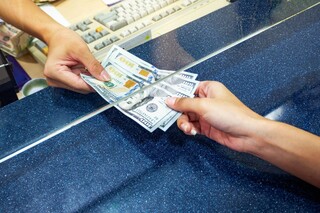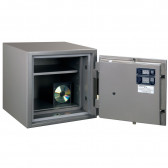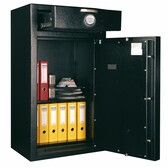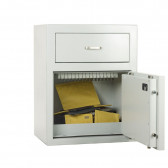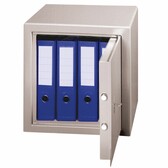Running a currency exchange office is a business that involves the daily circulation of cash with considerable values, which makes the risk of robbery and theft very high. In order to minimise them, it is necessary to take care not only of the security of the facility itself, but also of the sales, which should be stored in armoured cash boxes and vault safes. Money protected in solid containers with additional equipment, e.g. a time lock, can effectively deter thieves. We advise what else to pay attention to when choosing a safe for an exchange office.
Robberies in currency exchange offices are particularly dangerous. Thieves count on big loot and it happens that they are so determined that they use weapons to intimidate cashiers. To increase the safety of employees, as well as to protect cash from theft, it is worth investing in solid security. You can choose from mechanical solutions, such as bulletproof glass in windows, security curtains, as well as alarm and monitoring systems. However, all these methods may fail if the attackers are able to take the cash by force, which is why burglar-proof safes and heavy armoured strongboxes are considered to be the basic protection in currency exchange offices.
Cash under special surveillance
The specific model of container, its size and weight should be selected according to the possibilities of the premises. The anti-burglary class, in turn, should be matched to the amount of cash stored, which is specified in the table of acceptable limits of cash values stored by businesses in accordance with the Act on the Protection of Persons and Property. The type of lock is also an important selection criterion. Burglarproof safes are equipped with certified locks: key locks, locks with a code mechanism or electronic locks. Depending on your needs, there may also be a combination of the two.
Safety first
Even better security is provided by the time delay module. This is a function which, in the event of a robbery, allows the forced opening of the safe, but even though the correct code has been entered, the container will only open after a certain time has elapsed. It should be remembered, however, that for the protection of employees, information about such a function must be placed in a visible place. Additionally, it is worth equipping the safe with a set of sensors invisible to thieves and connecting it to the alarm system of the building. Thanks to this, if an attempt to break in is made, the safe will activate the alarm system. It is also worth considering the so-called silent alarm. This function informs the services about a burglary by entering a special code in the safe. The cashier can use it if a robbery occurs. No alarm will be triggered, but the safe will open with a time delay, giving the police time to catch the perpetrator "in the act".
Double security
In addition to a safe in the main room, it is also worth investing in a deposit safe for excess cash. It should be invisible and placed, for example, behind a wall, in the basement or in a place inaccessible to the cashier. It is worth mentioning that deposit boxes allow anyone to put cash inside. However, the cash can only be collected by authorised persons, e.g. the owners of the exchange office. There are many possibilities of security. The more of them there are, the more difficult and thus more risky a potential theft becomes for a thief, which discourages him from a robbery. The money spent on the purchase of a safe and the necessary alarm installations thus pays off in the form of increased security.
Check the drop safes at Hartmann Tresore!
You may also be interested in: Safe in the office – which one to choose?
Secure trade – drop and deposit safes in restaurants and petrol stations
Safes in pawnshops and exchange offices – which models to choose?
